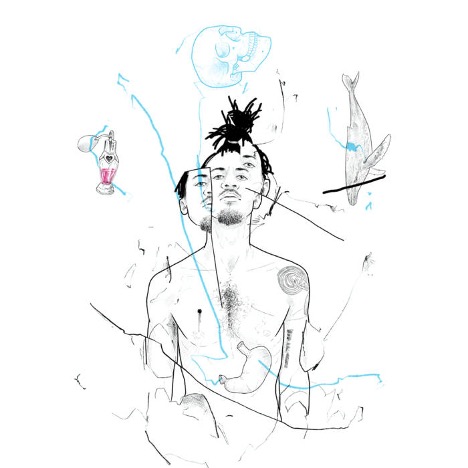Queer readings: Tyler Holmes’ hot new album
The Oakland-based experimental musician’s Nightmare in Paradise delivers.
Recently I found Ratskin Records, a Bay Area collective dedicated to “LGBTQ+, Black, Native, POC, and disabled artists who create work that is sonically and politically pushing boundaries toward liberation.” A mission statement like that had better deliver! And in Tyler Holmes’ (they/them) new album, Nightmare in Paradise, Holmes and Ratskin make good on that promise.
Created “in the wake of a violent trauma” in an otherwise “blissful” tour in Puerto Rico, the first words and notes of the album hint at that tension between fear and love. The rattling of the first track subsides to a soothing muted guitar, violin, and binaural vocals. Holmes says, “there’s everything to lose, / There’s light and there’s love.” However, when the track concludes, it is in a return to the gurgle and rattle of noise, suggesting that beauty is always arriving out of chaos and returning to that chaos.
But Holmes owns the liminal and the chaotic. As a queer Black person Holmes demonstrates that it is in the places outside genre that are most productive. Holmes infuses electronic music with folk and R&B. When the backup singers repeat “confuse me” against a low throbbing synth, you both ache for the joy of confusion and the pain of it. Someone seeking a straight-forward pop album will be confused; but someone who can sit with the seeming disconnection between a staticky electronic instrumental like “Concrete Balloon” and then dive into the poppy ’90s grunge-structured “The Girl You Knew” and see a through-line rather than a detour – well that listener earns the joy of the album.
When Holmes sings, “allowing my body to accept is easy” and the violin reappears like an old friend four tracks later, the ebb and flow of the album asks us to swim in the world Holmes has created – but not simply passively floating along, we have to be aware of the current and the rocks, we can’t fight the water or forget it. The sharp bends in Holmes’ river of sound are constructed by quickly shifting tonally between short tracks. Bliss and violence always at war.

Songs like “To Accept,” “Moss,” and “Song” sparkle with hints of The Postal Service or early Owl City yet they feel tense and somber. Then “Eden” comes out of nowhere as a dance song about paradise dissolving; this song made me question myself, “what in me wants to dance as Nero plays his fiddle?” That’s when it hit me:

Nightmare in Paradise, intentional or not, is a queer pandemic album. Released in March 2021 it speaks to the tug-of-war we all felt as people died in droves, Black lives were cavalierly taken by civilians and police, and the president did essentially nothing beyond tweeting. When Holmes sings, “it’s so cold in here in the hospital,/ it’s so hot outside in the rain,” I can’t help but think of the day the news of ACT UP AIDS activist Larry Kramer’s death came out, George Floyd was murdered, and New York City reached a new high in COVID deaths. Nothing was right anywhere or in anyway, and a year later we are still processing that. In “Guts” Holmes repeats, “you’re breaking my heart/ can’t you see.”
These are the words I would have said to America if I had had them at the time. Holmes had to make sense of his traumatic experience after the fact. In light of the past year(s), we are lucky to have Holmes’ words to help us make sense of this time. Holmes closes the album with “Canvas,” a softer less chaotic song than the opener, “Heart Token.” Here Holmes tells us they, and us too, “are starting with a clean slate.” The hope Holmes provides is the real through-line between the fear and the love at the edges of everyone’s trauma.
Get the album here.





